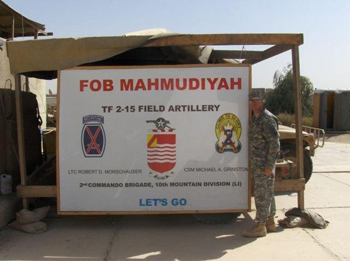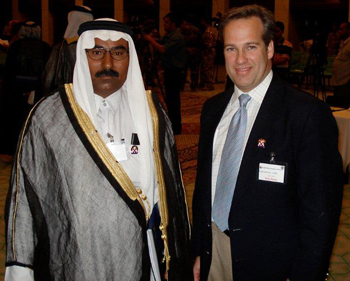When the U.S. Institute of Peace decided it would open a permanent office in Baghdad in 2004 to bring its training expertise and conflict resolution skills to the war in Iraq, it quickly became apparent to USIP personnel that the Institute was entering a whole new phase.
May 18, 2011
 When the U.S. Institute of Peace decided it would open a permanent office in Baghdad in 2004 to bring its training expertise and conflict resolution skills to the war in Iraq, it quickly became apparent to USIP personnel that the Institute was entering a whole new phase.
When the U.S. Institute of Peace decided it would open a permanent office in Baghdad in 2004 to bring its training expertise and conflict resolution skills to the war in Iraq, it quickly became apparent to USIP personnel that the Institute was entering a whole new phase.
Iraq was at one of its most violent periods of the war. Despite years of working in conflict zones, USIP personnel knew they were in for a far greater challenge than anything they’d known.
Before entering this new phase, they had to develop specific tools they would need to be effective in such a dangerous conflict zone. With a little help, USIP employees assembled a unique security manual to help them operate their new, permanent office in the middle of one of the most violent insurgencies the Institute had ever faced.
The manual dictated all kinds of security protocols, telling USIP’s Iraq team what to do in the event of a kidnapping, a security breach at the compound, or how USIP personnel should evacuate their quarters in an emergency. The manual turned out to be enormously useful, USIP employees recall.
But it was more than just a big binder in the corner of USIP’s dusty office in the Green Zone. For the Institute, the creation of the manual was the beginning of a new commitment to conflict resolution that would take the Institute out of its comfort zone and into the front lines of conflict. And for a nonpartisan, federally-funded organization whose culture had been defined largely by its academic research and professional training since its inception in 1984, the Institute was starting to redefine itself in ways that continue today.
“It was a complete shift for the organization,” says Sloan Mann, who headed USIP’s Baghdad office in those early days.
In the late 1990s, USIP had inserted itself deeply in Bosnia and Kosovo, with individuals serving in “semi-permanent” positions doing conflict mediation and negotiation work. But USIP had never taken the next step to create a permanent office that would allow it to do the kind of fieldwork that is critical to the Institute’s peacebuilding mission.
After getting the mandate and the money to open up a field office from Congress, members of USIP’s Iraq Team quickly went about locating an office in Baghdad. After some debate as to whether the team could work effectively away from the protections afforded by the U.S. military, members of the group settled on an old Republican Guard officer quarters building inside the Green Zone. It turned out to be a good decision, says Daniel Serwer, a former USIP official who was instrumental in opening up the new office.
“Circumstances got so rough that we would never have survived beyond the Green Zone,” Serwer recalls. That first office had just one American and a few Iraqis, but it was the first such permanent presence USIP had ever before established. It was important because it allowed the USIP team to have a continuing rapport with the very people with whom they were working and training. That ongoing presence was critical, USIP officials determined, in understanding the people and the dynamics on the ground. And, the Iraq Team would have missed important opportunities for peacebuilding if USIP experts had only “parachuted in” for weeks at a time.
“That added a whole new dimension,” Serwer says. “It’s one thing to have someone traveling abroad with you for several months, as we did in Kosovo. It’s quite another thing to hang out your own shingle and begin to have a face, a presence, that the host government, nongovernmental organizations and the embassy all recognize.”
Rusty Barber, who headed the Baghdad office later during the war, described establishing the office as “operationalizing USIP’s theory” – putting to the test all the years of academic research, training and analysis to contribute to actual peacebuilding in the field.
After establishing the Baghdad office, the Institute began to create training programs to help in conflict resolution for Iraqis. USIP personnel soon brought senior personnel from the Iraqi ministries defense, finance, justice and others to USIP’s headquarters in Washington to meet with their counterparts to help them glean other perspectives to take back to Baghdad. The Baghdad office grew into bigger, more important roles, helping Iraqis to address women’s issues on the ground and promoting religious tolerance among minority Christians and smaller populations like the Yezidis. That work continues today.
 But perhaps the biggest test came in 2007, when the Institute’s permanent presence in Iraq led to some of the most important work USIP did during the conflict. In the city of Mahmoudiya, south of Baghdad, in an area known as the “Triangle of Death,” the then-three-year-old insurgency was as strong as ever. USAID representatives, with heavy support from the military, reached out to the USIP Iraq team to ask them to convene tribal leaders, the Iraqi military and government to see if a peace agreement could be reached. Leveraging its advantage as an honest broker, USIP personnel brought the disparate parties together to hammer out a peace deal in Mahmoudiya. Part of the effort meant persuading Iraqi sheiks to return home after fleeing the war to Jordan. USIP facilitated a series of meetings in a hotel in Amman. Sheik Fariq Mebdir Ali, who assisted in the peace process at the time, wrote in a summary of the events that led to the peace deal that the Institute was instrumental in getting.
But perhaps the biggest test came in 2007, when the Institute’s permanent presence in Iraq led to some of the most important work USIP did during the conflict. In the city of Mahmoudiya, south of Baghdad, in an area known as the “Triangle of Death,” the then-three-year-old insurgency was as strong as ever. USAID representatives, with heavy support from the military, reached out to the USIP Iraq team to ask them to convene tribal leaders, the Iraqi military and government to see if a peace agreement could be reached. Leveraging its advantage as an honest broker, USIP personnel brought the disparate parties together to hammer out a peace deal in Mahmoudiya. Part of the effort meant persuading Iraqi sheiks to return home after fleeing the war to Jordan. USIP facilitated a series of meetings in a hotel in Amman. Sheik Fariq Mebdir Ali, who assisted in the peace process at the time, wrote in a summary of the events that led to the peace deal that the Institute was instrumental in getting.
(Photo at right: Former USIP official Rusty Barber at the signing ceremony for the peace deal in Mahmoudiya, Iraq.)
The sheik wrote: “I had maintained the relations with the American Institute of Peace [USIP] personally until now, benefiting from the great humanitarian experience of this institute in solving the crises and creating peace opportunities and solve the reasons of excuses.”
U.S. military commanders, too, took note of the Institute’s role in the peace deal. Gen. David Petraeus, then the top commander in Iraq, said USIP’s role in the turnabout there was “striking.” Other commanders singled out USIP’s role as well.
“Your initiatives helped save the lives of my guys and gave us other alternatives in nonviolent conflict resolution,” William Zemp, the former battalion commander from the U.S. Army’s 10th Mountain Division who worked with the Iraq team, wrote to a USIP staffer. “You made a big difference in Mahmoudiya.”
The move to establish a permanent presence in Baghdad required the Institute to take a deeper commitment to peacebuilding than it ever had before. But the move to open an office in the middle of the largest conflict since the Institute’s inception, helped it to become more than just academics pondering the world’s challenges but a key contributor to resolving conflict.



